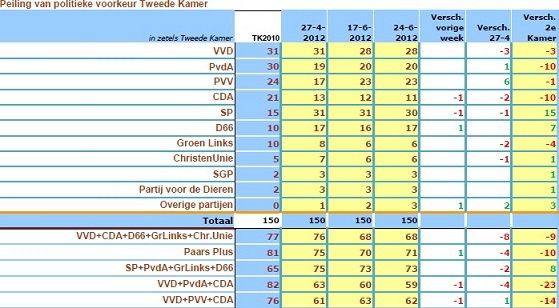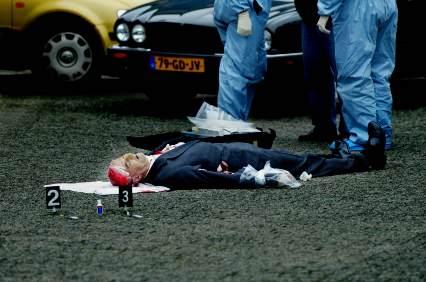
You may have missed it, but Holland is slowly but surely being gripped by election fever as election night creeps closer. It’s still a while away though, as they’re being held on 12 September. Yet the electioneering battle has already started, still low key, as the various parties position themselves. The mainstream parties (social-democrat PvdA, Christan Democrat CDA, right-liberal VVD, and for now, the xenophobic PVV of Geert Wilders) are not doing well for the moment, with the last three of course hindered by their involvement in the current, disastrous government, while the PvdA still hasn’t learned to meaningfully oppose. Instead, as you can see the voters have polarised, with the echt-socialist SP winning big, while the centrist-liberal D66 also profiting; they always do if they haven’t been in government for a while, only to lose again once in office.
But the biggest news is hidden under the heading “Overige partijen” — “other parties: the Dutch branch of the Pirate Party would’ve been elected to parliament with one seat had elections been held today! That’s quite impressive for an internet only (so far) party with very little name recognition so far. It’s also a sign of health for our democracy if they do manage to get a seat in parliament; even better if they get a couple more, as they themselves are hoping.
The Dutch political system is one that naturally drives parties to the centre, as no party is ever capable of securing a majority in parliament on its own. This leads to periods of bland conformity as the rightwing parties get a little more leftist and the leftwing parties get a lot more rightwing; the nineties were like that, when VVD, D66 and PvdA outmanoeuvred the CDA to rule for most of the decade. For every action there’s a reaction and that gets you periods of greater polarisation as well as the rise of new parties. D66 got its start as the first of them, wanting to break open the cozy relationships between the old parties, but has long since been captured by the system; various other parties didn’t last long or became “confessional”, splinter parties you voted for to be ideologically pure but with no real hope of ever winning power.
Lately of course, with the near-simultaneous rise of the SP from small leftwing to largest leftwing opposition party and the xenophobic and populist movements of first Pim Fortuyn, then Geert Wilders polarisation has come back with a vengeance. This in turn naturally offers changes for new parties that deliberately refuse to place themselves on the old left-righ axis: the Partij voor de Dieren, the animal rights party managed this during the last elections, might the Piratenpartij follow them during this one? I hope so, because the system needs new blood and ideas.

